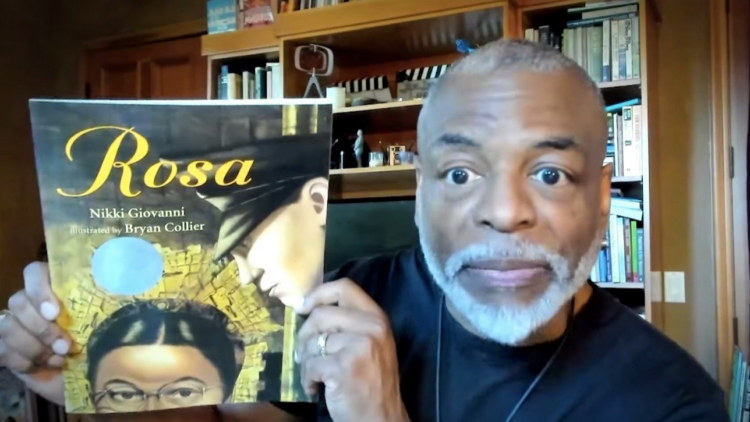While some may think that book banning is something that belongs in the 1950s, 2022 is here to prove them wrong. With the increasing controversy surrounding racism, gender studies, and even mental health in children’s classrooms, many schools are outlawing books that explore those topics. However, one central problem is that children may go into the world without the education that they need.
Books that seem too “left-leaning” have been politicized, even though many of them explore important topics like slavery, racism, the Holocaust, colonialism, and other parts of American history. Actor and classic Reading Rainbow host, LeVar Burton’s video about the controversy was played on The Daily Show with Trevor Noah —- and neither of them are on board with the recent book bans.
LeVar was shocked by which books were banned

Burton was confused that books honoring civil rights leaders, nurturing families, and children coming of age were viewed as inappropriate for kids. Most books have messages and stories that are meant to help children navigate the world, and banning them will likely take away integral parts of their education.
Who’s banning the books?

School boards across the United States have been removing books based on complaints from parents, librarians, and/or community members. They believe that kids read certain books and feel ashamed, embarrassed, uncomfortable or guilty. So, they requested for them to no longer be available. However, books by nature, are meant to evoke certain emotions that help children develop empathy, social consciousness, and history.
There are important topics many banned books cover

While history can be difficult for kids to process, it’s important for them to learn about different experiences, especially because many of them will unfortunately encounter racism, anti-blackness, anti-semitism, sexism, ableism and intersections of those hardships. Refusing to discuss a matter, doesn’t make it stop being impactful on how kids grow up.
Studying race can help children support each other

In many cases, people believe stereotypes and stigmas about others based on race because they’ve never been shown otherwise. Which is why it’s important for kids to read a diversity of books about BIPOC characters that are able to exist through many lenses. Later on in life, it may be harder for them to have that level of empathy and openness.
Books that challenge gender norms can inspire kids

When young girls are called “weak,” it can make them feel inferior and when boys must “always be strong,” it can make them feel scared. When kids are forced to behave or be labeled in ways that limit them, they can become depressed . Reading about characters that are unapologetically themselves is what gives many children the courage to be who they are, too.
Children are exposed to culture every day

From watching TV and movies to speaking with others, kids are exposed to an influx of information that’s hard to process and understand. Yet, books help put things into perspective and give them the tools to contextualize what they see — which goes beyond books.
Some people believe book banning is about politics

While some think book banning comes down to protecting kids, others believe that it’s about political power. Certain states, cities and communities don’t want their kids swayed to be more liberal or conservative. They believe that some schools are “pushing agendas.” However, it becomes complicated when every school has its unique set of guidelines and expectations for books.
People are sad to see the books they grew up with taken away

Books have the power to transport readers to new worlds, make them laugh, cry, and sometimes even change their lives. Many parents want to see their children have the same opportunities to explore books freely and never feel limited.
Censorship has always been a tricky topic

Questioning the contents of the books we read is nothing new, especially for concerned parents. However, it’s often hard to strike a balance between what is caring protection and oppressive censorship. When school administrations, teachers, libraries, community members, and even politicians can limit what can be accessed, things can get a lot more complicated.
There are many who feel the same as LeVar

Historically, several communities, especially BIPOC ones, have been left out curriculums. However, books often assist in bridging that gap–if the right ones are available. As Burton pointed out, some books need to stay in the classroom.

We want to hear from YOU so we can serve you better. Complete this quick survey and you will be entered to win a grand prize of $2,000, or a chance to win one of 10 Diply prize-packs!

















































